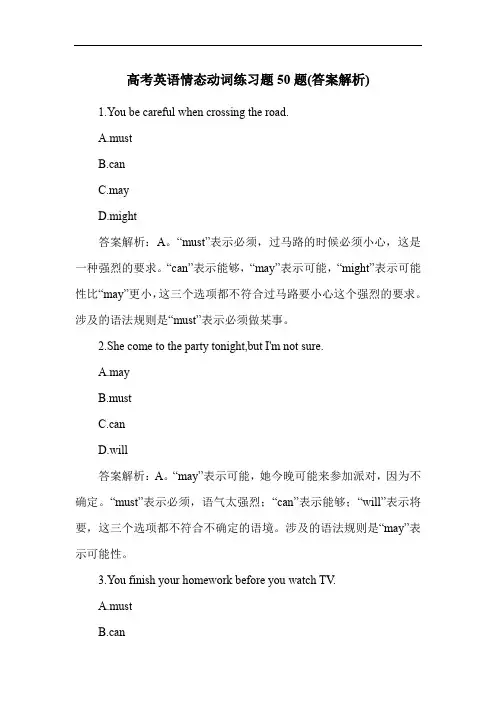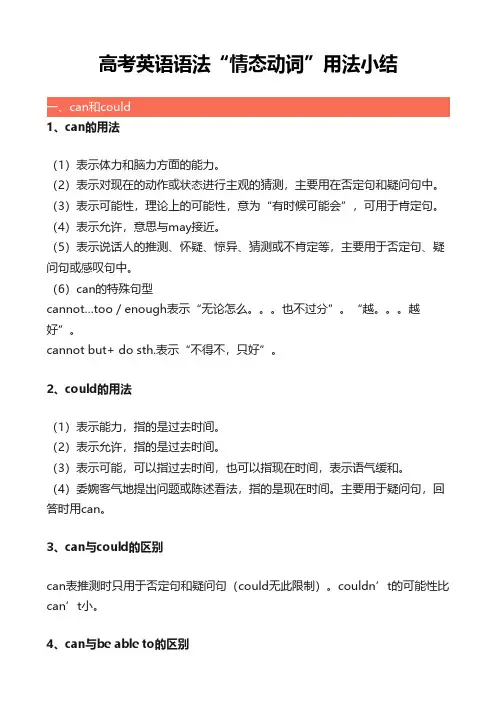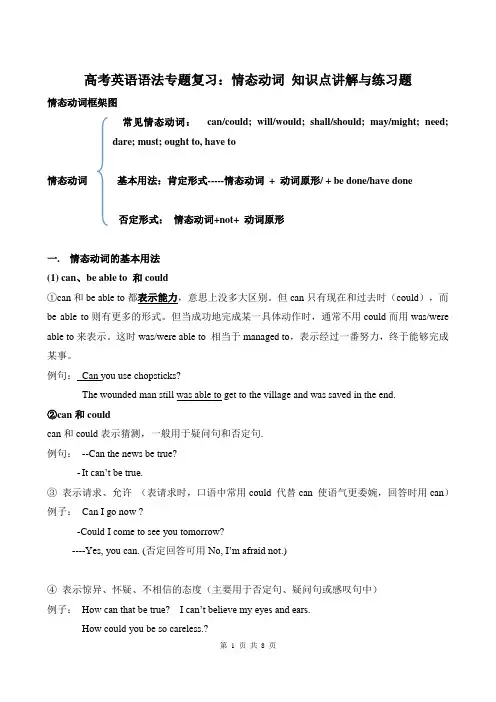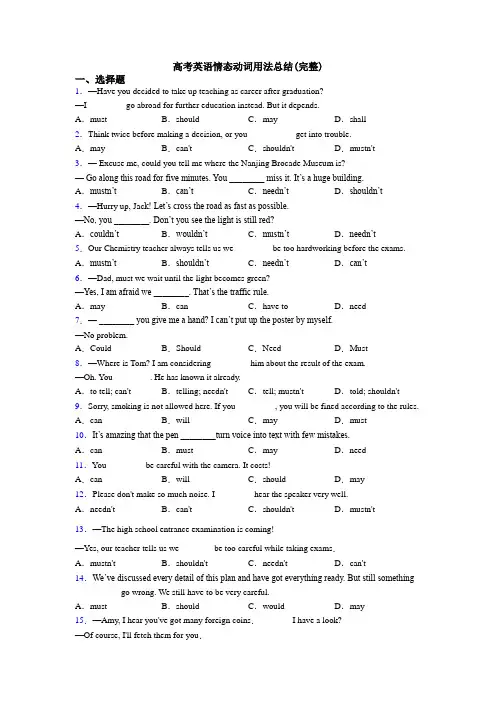高考英语情态动词用法归纳与练习
- 格式:doc
- 大小:55.00 KB
- 文档页数:12

高考英语情态动词练习题50题(答案解析)1.You be careful when crossing the road.A.mustB.canC.mayD.might答案解析:A。
“must”表示必须,过马路的时候必须小心,这是一种强烈的要求。
“can”表示能够,“may”表示可能,“might”表示可能性比“may”更小,这三个选项都不符合过马路要小心这个强烈的要求。
涉及的语法规则是“must”表示必须做某事。
2.She come to the party tonight,but I'm not sure.A.mayB.mustC.canD.will答案解析:A。
“may”表示可能,她今晚可能来参加派对,因为不确定。
“must”表示必须,语气太强烈;“can”表示能够;“will”表示将要,这三个选项都不符合不确定的语境。
涉及的语法规则是“may”表示可能性。
3.You finish your homework before you watch TV.A.mustB.canC.mayD.might答案解析:A。
“must”表示必须,先完成作业才能看电视,是一种规定。
“can”表示能够,“may”表示可能,“might”表示可能性比“may”更小,这三个选项都不符合规定的语境。
涉及的语法规则是“must”用于表示必须做某事。
4.He be very tired after a long day at work.A.mustB.canC.mayD.might答案解析:A。
工作了一整天后他肯定很累,“must”表示肯定的推测。
“can”表示能够,“may”表示可能,“might”表示可能性比“may”更小,这三个选项都不如“must”的推测强烈。
涉及的语法规则是“must”表示肯定的推测。
5.We take an umbrella.It might rain later.A.mustB.canC.mayD.should答案解析:D。

高考英语语法“情态动词”用法小结1、can的用法(1)表示体力和脑力方面的能力。
(2)表示对现在的动作或状态进行主观的猜测,主要用在否定句和疑问句中。
(3)表示可能性,理论上的可能性,意为“有时候可能会”,可用于肯定句。
(4)表示允许,意思与may接近。
(5)表示说话人的推测、怀疑、惊异、猜测或不肯定等,主要用于否定句、疑问句或感叹句中。
(6)can的特殊句型cannot…too / enough表示“无论怎么。
也不过分”。
“越。
越好”。
cannot but+ do sth.表示“不得不,只好”。
2、could的用法(1)表示能力,指的是过去时间。
(2)表示允许,指的是过去时间。
(3)表示可能,可以指过去时间,也可以指现在时间,表示语气缓和。
(4)委婉客气地提出问题或陈述看法,指的是现在时间。
主要用于疑问句,回答时用can。
3、can与could的区别can表推测时只用于否定句和疑问句(could无此限制)。
couldn’t的可能性比can’t小。
4、can与be able to的区别(1)现在时:无区别,但后者不常用。
(2)完成时;can没有完成时,此时要用have(has,had)been able to。
(3)将来时:can没有将来时,要用will be able to。
(4)过去时:could表示一般能力,was/were able to 表示在具体场合通过努力成功做成某事的能力。
1、may的用法(1)表示询问或说明一件事可不可以做。
(2)表示一件事或许会发生或某种情况可能会存在,通常用在肯定句和否定句中。
注意:表示可能性时,can’t语气强,表示“不可能”,may not语气弱,表示“可能不”。
2、might的用法(1)表示询问或允许,指的是过去时间。
(2)表示可能发生的事,可以指过去时间,也可以指现在时间,语气更加不肯定,可能性比may小一些。
3、may与might的特殊用法(1)“may+主语+动词原形”表示祝愿。

高考英语语法专题复习:情态动词知识点讲解与练习题情态动词框架图常见情态动词:can/could; will/would; shall/should; may/might; need;dare; must; ought to, have to情态动词基本用法:肯定形式-----情态动词+ 动词原形/ + be done/have done否定形式:情态动词+not+ 动词原形一. 情态动词的基本用法(1) can、be able to 和could①can和be able to都表示能力,意思上没多大区别。
但can只有现在和过去时(could),而be able to则有更多的形式。
但当成功地完成某一具体动作时,通常不用could而用was/were able to来表示。
这时was/were able to 相当于managed to,表示经过一番努力,终于能够完成某事。
例句:Can you use chopsticks?The wounded man still was able to get to the village and was saved in the end.②can和couldcan和could表示猜测,一般用于疑问句和否定句.例句:--Can the news be true?-It can’t be true.③表示请求、允许(表请求时,口语中常用could 代替can 使语气更委婉,回答时用can)例子:Can I go now ?-Could I come to see you tomorrow?----Yes, you can. (否定回答可用No, I’m afraid not.)④表示惊异、怀疑、不相信的态度(主要用于否定句、疑问句或感叹句中)例子:How can that be true? I can’t believe my eyes and ears.How could you be so careless.?⑤ can 的特殊用法Can but 只好can’t but 不得不can’t …too 再….也不为过,越..越好can not but do 表示“不得不/只好做”can’t help but do 没有办法只有做can’t chose but do 没有选择只能做can do nothing but do 只能做have no choice but to do 别无选择而只有例子:I can but wait.I can’t but wait.You can’t be too patient to the customers.(2) may/might①may/might表示可能,但may比might可能性大。

情态动词情态动词有can (could), may (might), must, have to, shall (should, will (would), dare (dared), need (needed), ought to等。
情态动词无人称和数的变化;不能单独使用,必须与其后的动词原形构成谓语。
一、can, could1) 表示能力(体力、知识、技能)。
如:Can you lift this heavy box? (体力)Mary can speak three languages.(知识)Can you skate?(技能)此时可用be able to代替。
Can只有一般现在式和一般过去式;而be able to则有更多的时态。
如:I’ll not be able to come this afternoon.当表示“经过努力才得以做成功某事”时应用be able to,不能用Can。
如:He was able to go to the party yesterday evening in spite of the heavy rain.2) 表示请求和允许。
-----Can I go now?----- Yes, you can. / No, you can’t.此时可与may互换。
在疑问句中还可用could, might代替,不是过去式,只是语气更委婉,不能用于肯定句和答语中。
---- Could I come to see you tomorrow?---- Yes, you can. ( No, I’m afraid not. )3) 表示客观可能性(客观原因形成的能力)。
They’ve changed the ti metable, so we can go by bus instead.This hall can hold 500 people at least.4) 表示推测(惊讶、怀疑、不相信的态度),用于疑问句、否定句和感叹句中。

高中情态动词专项练习200题Ⅰ.情态动词的特征:①本身有词义;②不能独立作谓语;③后接动词原形一起构成谓语;④不随人称和数的变化。
Ⅱ.情态动词各自的基本意义及用法:1.can 与could用法2.may与might用法3.must与have to用法4.need与dare用法5.should与ought to用法6.shall与will用法7.used to与would用法Ⅲ.情态动词表推测:1.大多数情态动词(除表‘能力、许可、意志’外),都可以表示推测,其程度有差异。
按可能性程度的高低排列为:must﹥will ﹥would ﹥ought to ﹥should完全肯定完全可能很可能﹥can ﹥could﹥may ﹥might可能有可能2.区分情态动词的否定含义:may not或许不、可能不might not可能不can’t 不可能mustn’t不许、禁止shouldn’t不应该needn’t 不必3.情态动词表推测具体运用:情态动词可以对现在、进行、过去推测。
4.表示反劝的特殊的表推测形式5.注意:Ⅳ.情态动词表推测的反意疑问句1.情态动词表推测的反意疑问句,简单来说,就是以情态动词后的时态为淮,如句子里有明确的时间状语,则以其为准。
2.以must 为例:e.g.: 1.You must be hungry now, aren’t you?2.He must be watching TV , isn’t he ?3.Tom must have lived her for a long time, hasn’t he ?4.She must have arrived yesterday, didn’t she?注:如选择题中(以She must have arrived yesterday, didn’t she?为例)既有didn’t she又有hasn’t she 则以didn’t she?为最佳答案。

高考英语语法词汇专项突破:02情态动词用法考点扫描+巩固练习+答案【要点速览】一、表力量的情态动词;二、表推想的情态动词;三、表必需的情态动词;四、表恳求允许的情态动词;五、表示对已经发生的事情的推想、责怪、懊悔、圆满等情态动词结构【高考真题呈现】【考例1】(2021年天津卷第一次)It used to be that you ___drive for miles here without seeing another person, but now there are houses and people everywhere.A.need B.should C.could D.must答案与解析:C。
考查情态动词推想功能。
A. need 需要;B. should 应当,理应如此;C. could 可能,表示对客观可能性的推想;D. must 肯定,必需。
依据前半句意思可知,表示的是对客观可能性的推想。
故选C。
句意:以前你可能在这里开了几英里,都没见过别人,但现在处处都是房子和人。
【考例2】(2021年天津卷其次次)---I honestly don't think I'm going to be admitted.---Wel1, you never know! You________ a better impression than you think.A. may have madeB. should have madeC. couldn't have madeD. needn't have made答案与解析:A。
考查情态动词推想用法。
A.may have made 可能;B.should have made本应当做;C.couldnt have made不行能做;D.needn't have made本不必做。
依据句意可知,此处表示的是有可能,故选A。

高中英语情态动词形式练习题40题含答案解析1.You come to the party tonight if you finish your homework.A.canB.couldC.mayD.might答案解析:A。
“can”表示有能力或有机会做某事,在这里表示如果你完成作业就有机会来参加今晚的派对。
“could”和“might”语气较委婉,“may”通常表示可能性。
在这个语境中,强调有能力和机会,用“can”最合适。
2.She pass the exam if she studies hard.A.canB.couldC.mayD.might答案解析:A。
同样,这里强调如果她努力学习就有能力通过考试,“can”表示能力。
“could”“might”语气委婉,“may”表示可能性,这里突出能力,所以选“can”。
3. you help me with this math problem?A.CanB.CouldC.May答案解析:B。
这里用“could”表示委婉地请求,“can”语气较直接,“may”和“might”在这个语境中不太符合请求的语气。
4.I ask you a question?A.CanB.CouldC.MayD.Might答案解析:C。
“may”用于请求许可比较正式,“can”也可以用于请求但相对不那么正式,“could”和“might”语气委婉但在这里不太符合直接请求的语境。
5. he come to school late today?A.CanB.CouldC.MayD.Might答案解析:D。
“might”在这里表示对可能性的较小推测,他今天有可能会迟到吗?“can”和“could”通常不用于这种较小可能性的推测,“may”也不太符合这个语境。
6. you lend me your pen?A.CanB.CouldD.Might答案解析:B。
“could”表示委婉地请求借笔,“can”语气较直接,“may”和“might”不太符合请求借东西的语境。

高考英语情态动词用法总结(完整)一、选择题1.—Have you decided to take up teaching as career after graduation?—I ________ go abroad for further education instead. But it depends.A.must B.should C.may D.shall2.Think twice before making a decision, or you __________ get into trouble.A.may B.can't C.shouldn't D.mustn't3.— Excuse me, could you tell me where the Nanjing Brocade Museum is?—Go along this road for five minutes. You ________ miss it. It’s a huge building. A.mustn’t B.can’t C.needn’t D.shouldn’t 4.—Hurry up, Jac k! Let’s cross the road as fast as possible.—No, you ________. Don’t you see the light is still red?A.couldn’t B.wouldn’t C.mustn’t D.needn’t5.Our Chemistry teacher always tells us we ________ be too hardworking before the exams. A.mustn’t B.shouldn’t C.needn’t D.can’t 6.—Dad, must we wait until the light becomes green?—Yes, I am afraid we ________. That’s the traffic rule.A.may B.can C.have to D.need7.—________ you give me a hand? I can’t put up the poster by myself.—No problem.A.Could B.Should C.Need D.Must 8.—Where is Tom? I am considering ________ him about the result of the exam.—Oh. You ________. He has known it already.A.to tell; can't B.telling; needn't C.tell; mustn't D.told; shouldn't 9.Sorry, smoking is not allowed here. If you ________ , you will be fined according to the rules. A.can B.will C.may D.must10.It’s amazing that the pen ________turn voice into text with few mistakes.A.can B.must C.may D.need11.You ________ be careful with the camera. It costs!A.can B.will C.should D.may12.Please don't make so much noise. I ________ hear the speaker very well.A.needn't B.can't C.shouldn't D.mustn't 13.—The high school entrance examination is coming!—Yes, our teacher tells us we _______ be too careful while taking exams.A.mustn't B.shouldn't C.needn't D.can't14.We’ve discussed every detail of this plan and have got everything ready. But still something __________ go wrong. We still have to be very careful.A.must B.should C.would D.may 15.—Amy, I hear you've got many foreign coins._______ I have a look?—Of course, I'll fetch them for you.A.May B.MustC.Should D.Need16.When I was young, my father ___________ take me to climb the hill which was not far from our house.A.may B.must C.would D.should 17.—Shall we go camping this summer holiday?—Nothing________be better.A.should B.could C.must D.may 18.—Would you please________in that way? That’s not safe!—Sorry. I won’t do it any more.A.not driving B.not to drive C.no driving D.not drive 19.—Will your mother be at home this Saturday?—Hard to say. She _______go to the countryside to see my grandparents.A.must B.may C.can D.would20.I ________ hear you clearly. Would you please repeat it?A.mustn’t B.can’t C.needn’t D.shouldn’t 21.—Could you tell me how to renew the library books?—With pleasure. You ________ come to our desk every time. It’s easier to renew them online. A.can’t B.mustn’t C.needn’t D.shouldn’t 22.—Must I finish all my homework today, Mum?—No, you ________, my dear. You can finish some tomorrow if you like.A.needn’t B.s houldn’t C.can’t D.mustn’t 23.—Suzy described every detail of the accident just now.—Her memory ________ be completely back.A.shall B.need C.must D.could24.—Is that Mr Zhou?—It ________ be him. He has gone to Beijing.A.can B.may C.can’t D.shouldn’t 25.— Mum, why do I have to wash hands so many times a day?—You ________ be too careful, for your health.A.can’t B.mustn’t C.may not D.needn’t26.I think all the students love the weekends because, to them, they ________ get up early on Saturdays or Sundays.A.mustn’t B.don’t need C.needn’t D.can’t27.—Is it usually warm in Yancheng in May?—Yes. But it _______ be rather cold sometimes.A.must B.should C.would D.can28.You ________ pay too much attention to protecting yourself if you plan to go abroad. A.mu stn’t B.can’t C.shouldn’t D.needn’t29.—Is it really necessary for me to go shopping with a mask on?—I’m afraid you ________ in public. It is not only to protect yourself but also to protect others. A.must B.should C.can D.need30.— The sandstorm in Beijing is so serious this year.— Yes, I wonder when we ________ worry about the air we breathe.A.can’t B.mustn’t C.needn’t D.shouldn’t 31.You _________ smoke here! Look at the sign. It says "No smoking".A.needn't B.mustn't C.can D.may32.—The article says t hat a person’s animal sign decides his personality.—You ________ read it for fun, but don’t believe in that.A.can B.must C.shouldn’t D.needn’t 33.—How beautiful the winter jasmines (迎春花) are!—Yes. These golden-yellow flowers ________ be widely seen in my city in March.A.must B.can C.would D.should 34.—Mum, I bought some strawberries on my way home.—Oh, you’re so sweet. But the strawberries ________ be put into the fridge for freshness. A.must B.can C.may D.need35.— What do you think of the show yesterday?— Some of them were really good but others ________ be better.A.will B.must C.need D.can36.—________ I see your ID card? We have to check your personal information.—Sure. Here you are.A.May B.Need C.Should D.Must37.—I don’t care what people thin k.—Well, you _______ . Some opinions are worth weighing.A.should B.might C.could D.would38.You ________ drive after drinking alcohol(酒). It’s against the law.A.mustn’t B.needn’t C.couldn’t D.wouldn’t39.We teenagers ________ have dreams. With dreams and hard work, anything amazing________ be created.A.may; can B.might; should C.should; can D.must; has to 40.—Excuse me. I haven’t finished reading the book yet. May I keep it a bit longer?— Sorry, you ________. You must return it on time.A.needn’t B.c an’t C.won’t D.shouldn’t【参考答案】一、选择题1.C解析:C【详解】句意:——你决定毕业后从事教书工作了吗?——我可能出国深造。

高中英语语法专攻-《情态动词》【考点1-can&could】·can和could 表推测对现在或将来的推测,两者均可用,但can 通常只用于否定句或疑问句中,一般不用于肯定句,而could则可用于肯定句、否定句和疑问句;对过去的推测,应在can,could 之后接动词的完成式,且此时can仍只用于否定句或疑问句,不用于肯定句;而could 则可用于各种句型。
如:Can [Could] this be true? 这能是真的吗Where can [could] he have gone? 他能到哪里去了呢She can’t [couldn’t] have left so soon. 她不可能走得这么早。
He could have gone home. 他可能已回家了。
【注:could后接动词的完成式,除表示对过去的推测外,还可表示过去没有实现的可能性(即某事本来可以发生,却没发生),或委婉地责备某人过去应该做某事而没有去做(此时不用can)。
】如:You could have started a little earlier. 你本可早点动身的。
You needn’t have co oked it. We could have eaten it raw.你其实可以不煮熟(它),我们(本来)可以生吃。
·can和could表允许表示现在的允许时,若是请求别人允许自己做某事,两者均可用,但用could 语气更委婉;若是自己允许别人做某事,一般只用can,而不用could。
如:Can [Could] I come in? 我可以进来吗“Could [Can] I use your pen? ” “Yes,of course you can.”“我可以借用你的钢笔吗?”“当然可以。
”(不能说Yes,you could.)表示过去的允许时,若表示过去一般性允许(即表示某人随时都可以做某事),用could;若表示在过去某一特定情况下允许进行某一特定的活动,则不用could。

情态动词常见的情态动词有:can 能may 可以will,would (表意愿)need 需要dare 敢must 必须have to 不得不shall,should 应该(表义务)ought to 应该1.can,could 的用法1.1表能力,有“能”、“会”、“能够”的意思例如:Can you drive a car? 你会开车吗?-----Yes, I can. 我会。
-----No, I can't. 我不会。
1.2表允许,在口语中代替may,有“可以”的意思例如:Can I use your bike?我可以用你的自行车吗?1.3表示可能性,常用于否定句和疑问句例如:Can it be true?那会是真的吗?Today is Sunday. He can't be at school.今天是星期天。
他不可能在学校里。
1.4过去式could表示的语气更加委婉、客气例如:Could I come to see you tomorrow?明天我可以来见你吗?1.5 can 和be able to 的比较1) can 只有一般现在时和一般过去时两种时态(could),其他时态要用be able to的形式例如:I haven't been able to get in touch with her.我一直没能和她联系上。
2) 通常can 和be able to 可以互换例如:He will come if he can.如果可能的话,他一定会来。
2.may,might的用法2.1表示许可或征求对方的许可,有“可以”的意思。
例如:You may go now.你可以走了。
May I use your computer?我用一下你的电脑可以吗?2.2回答以may开头的疑问句有如下表达法:例如:May I smoke here? 我可以在这儿抽烟吗?-----Yes, you may.-----Yes, please.------No, you can't.------No, you mustn't.------No, you'd better not.2.3表示猜测,通常只用于陈述句例如:You may be right.你可能是对的。

高考英语情态动词用法及解题技巧高考英语情态动词用法及解题技巧导语:情态动词是中学英语语法的重点,也是高考的热点。
只用作情态动词的有:can/could,may/might,must,ought to,be able to;既可作情态动词又可作实义动词的有:need,dare;既可作情态动词又为助动词的有:shall/should/w1ll/would。
以下是小编为大家精心整理的高考英语情态动词用法及解题技巧,欢迎大家阅读参考!1情态动词need的用法1. need作情态动词,一般用于疑问句和否定句中,表示“需要”、“必要”。
当其用于现在时和将来时时,在宾语从句中可当过去时用。
肯定回答用must(或have to, ought to, should) 来表达。
否定式为need not / needn't表示“不必,不需要”。
如:(1) You needn't show your passport at the entrance unless the guard asks you for it.(2) —Shall I tell Jack about it?—No, you needn't. I've told him already.2. need作实义动词,意为“需要”、“要求”。
如:(1) You don't need to leave so early.(2) He needs to try one more experiment.2情态动词dare的用法1. 情态动词,表示“敢”,后接动词原形,用于否定句、疑问句和条件状语从句中。
如:(1) We dare not refuse their request.(2) Dare you walk through the forest at night?2. 当实义动词用时,可用于各种句型中。
dare作实义动词用在否定句和疑问句中时,其后接不定式有时可省去“to”。
情态动词在高考中的用法
情态动词是指表示说话人的语气、态度或情绪的动词,它们不能单独作谓语,必须和其他动词一起构成谓语。
在高考中,情态动词的用法是一个重要的考点,以下是情态动词的常见用法:
1. 表示能力:can, could, be able to
- can 表示现在的能力;could 表示过去的能力;be able to 表示通过努力能够做到。
2. 表示许可或请求:can, could, may, might
- can 和 could 表示许可或请求时,常用于口语中;may 和might 表示许可或请求时,语气比较正式。
3. 表示可能性:may, might, can, could
- may 和 might 表示可能性时,语气比较弱;can 和 could 表示可能性时,语气比较强。
4. 表示推测:must, can't, could, might
- must 表示肯定的推测,语气最强;can't 表示否定的推测,语气也很强;could 和 might 表示推测时,语气较弱。
5. 表示义务或责任:must, should, ought to
- must 表示必须做某事,语气最强;should 和 ought to 表示应该做某事,语气较弱。
6. 表示虚拟语气:would, could, might
- would, could, might 用于虚拟语气中,表示与现在事实相反或与过去事实相反的情况。
在高考中,情态动词的用法需要根据具体的语境来判断,因此需要考生具备较强的语言理解能力和运用能力。
同时,考生还需要注意情态动词的时态和语态等方面的变化,以确保答案的准确性。
高考英语情态动词辨析运用练习题30题答案解析1.She have known the answer,for she looks so confident.A.mustB.canC.shouldD.need答案解析:A。
“must”在这里表示肯定的推测,因为她看起来很自信,所以一定知道答案。
“can”表示能力或可能性,不太符合此处语境。
“should”表示应该,不符合推测的意思。
“need”表示需要,也不符合。
2.He speak three languages fluently.A.canB.mustC.shouldD.need答案解析:A。
“can”表示能力,他能流利地说三种语言。
“must”表示必须或肯定的推测,这里不是推测也不是必须的意思。
“should”表示应该,不符合语境。
“need”表示需要,也不合适。
3.You finish your homework before you go out to play.A.mustB.canC.shouldD.need答案解析:A。
“must”表示必须,你必须在出去玩之前完成作业。
“can”表示能力或可能性,这里不是能力或可能性的意思。
“should”表示应该,语气没有“must”强烈。
“need”表示需要,不符合语境。
4.It be raining outside,for I can hear the sound of rain.A.mustB.canC.shouldD.need答案解析:A。
“must”表示肯定的推测,因为能听到雨声,所以一定在下雨。
“can”表示能力或可能性,不太符合此处语境。
“should”表示应该,不符合推测的意思。
“need”表示需要,也不符合。
5.She have forgotten to bring her book,for she is looking everywhere for it.A.mustB.canC.shouldD.need答案解析:A。
高考英语情态动词练习题50题(带答案)1. You ______ be tired after working for eight hours without a break.A. canB. mayC. mustD. should答案解析:C。
must表示肯定的推测,根据题意,连续工作八小时不休息肯定会累,所以这里用must。
A选项can表示能力或可能性,通常用于否定句和疑问句中表示推测,这里不符合语境。
B选项may表示可能,可能性较弱,没有must肯定。
D选项should表示应该,与题意推测累不累不相关。
2. - ______ I use your pen? - Sure. Here you are.A. MustB. MayC. NeedD. Should答案解析:B。
May用于征求对方许可,在这个句子中是询问是否可以使用对方的笔,符合语境。
A选项Must表示必须,C选项Need 表示需要,D选项Should表示应该,都不符合这个征求许可的语境。
3. He ______ speak English when he was five years old.A. couldB. canC. mayD. must答案解析:A。
could是can的过去式,表示过去的能力,句中提到他五岁的时候,是过去的时间,所以用could表示过去能说英语。
B选项can表示现在的能力。
C选项may表示可能,D选项must表示肯定的推测,都不符合这里表示过去能力的语境。
4. - Where is Tom? - He ______ be in the library. I'm not sure.A. canB. mayC. mustD. should答案解析:B。
may表示可能性,根据I'm not sure可知说话者不确定,只是一种可能,所以用may。
A选项can用于否定句和疑问句中表示推测,这里是肯定句。
高考英语情态动词技巧(很有用)及练习题一、单项选择情态动词1.would可以表达过去常常做的事,过去习惯发生的动作:Pirates would bury gold in a cave. 海盗们常常把黄金藏在山洞中。
We would take a walk along the river. 我们过去常常沿河散步。
3. would后接like、love、mind等动词,表示要求、邀请、希望或询问,此时不是说过去,而是对现在的询问:Would you like to come to my party? 你愿意来我的派对吗?Would you mind coming with us? 你介意和我们一起吗?比如本题,would 表示婉转的请求,征求对方的意见,故选A。
2.—Jim ________ what I said annoying though he didn’t say anything.— So you mean you will have to apologize to him?A.must find B.might find C.should have found D.must have found 【答案】D【解析】【详解】考查must have done结构。
句意:——吉姆一定觉得我说的话很让人烦,尽管他什么也没说。
——所以你是说你得向他道歉?根据“though he didn’t say anything.”可知此处表示对过去事情的肯定推测,用must have done表示“过去一定做了……”,故D项正确。
3.We ________ take clean drinking water for granted. One day we may run out of it. A.needn't B.can'tC.won't D.shouldn't【答案】D【解析】【详解】考查情态动词。
高中英语情态动词用法归纳与练习A: can / could = be able to1 表示能力两种时态can (could),其他时态要用be able to的形式He can speak French.Was/were able to 可以表示成功做成某事的含义* managed to do / succeeded in doing With our help, he was able to build the house.2 表示请求或许可Could 比Can 更加客气* mayCan I go now? Yes, you can.3 表示推测或可能性,常用于否定句和疑问句Can he be at school?Today is Sunday. He can't be at school.Can’t couldn’t/ Can ? Could? have doneThere is no light in the room. Can she have gone to bed?She can’t have gone to school----- it’s Sunday.Could have done 可用在肯定句中表示过去存在的可能性* may have doneShe could have gone out with some friends yesterday.Could have done 可以表示虚拟语气某事可能发生(并没有发生)It was silly to throw the TV out of the window. It could have hit somebody.批评某人没有完成某事(本可以做某事)You are late again. You could have got up earlier.4 can 表示客观上的可能性*Anybody can make mistakes.B: may and might1 表示请求和允许类似用法can could(更加口语化)May I watch TV now? Yes, you may.2 表示可能性; 猜测might比may更加不确定may/might have done 对过去的揣测* He may be busy these days.May not 可能不;不可能;一定不可3 表示祝愿Wish you success!May you succeed!*C: must and have to1 表示必须;一定要可以用have to 代替must 现在;将来的必须而且是主观看法*have to 有多种时态而且强调客观情况I really must stop smoking now.I had to leave early because I wasn’t feeling well.Must I come here?Yes, you mu st. No, you needn’t. needn’t / don’t have to must not 一定不能做某事must n’t2 must 表示推测意思非常肯定“一定是”“一定会”It must be raining outside.Must have done 对过去/完成的推测* must have done, didn’t / hasn’tMust be doing 推测现在正在进行He must have gone over the article, hasn’t he?It must have rained last night, didn’t it?D: need and dare 过去时dared情态动词和实意动词的区别A 人称变化B do / to doC 直接否定/ 间接否定can workNeed /dare 肯定句中,实义动词She needs to do it. I dare to do it.使用在否定句,疑问句中,情态动词,实义动词。
I dare not do it. I don’t dare (to) do it.I need not do it. I don’t need to do it.1 need 情态动词无时态;人称的变化多用于疑问句和否定句You needn’t try to explain.Needn’t = don’t have toNeedn’t have done sth 过去本不必做某事* 虚拟语气2 need 实义动词有时态;人称的变化后接to do You need to tell us the truth.The car needs repairing. The car needs to be repaired.3 dare 情态动词过去时dared 无人称的变化多用在疑问句和否定句Dare he tell them what he knows?4 dare 实义动词有时态;人称的变化后接to do用于疑问句和否定句时其后的to 有时可省略Do you dare (to) jump off the high wall?E: will and would1 表示征求对方(第二人称)意见或询问对方意愿would 比will 更客气委婉Will you have some more wine?Would you mind my smoking here?2 will 表示习惯性动作或某种倾向would 表示过去习惯性动作或某种倾向Fish will die out of water.When I was young, I would play badminton on Sundays.Would 与used to 的区别*Would 只能用来表示重复的动作而不能表示状态Used to 既可表示动作也可表示状态, 强调现在不如此He used to be a university student.3 will 表示意愿决心I will never do that again.F: shall, should and ought to1 shall 在问句中表示征求对方意见或请求用于第一,三人称What shall we do now?2 shall 肯定句中表示说话人强烈的感情允许,命令,禁止和威胁*或表示按规定,规章和义务等用于第二,三人称If you dare to do that, you shall be punished.These rules shall be obeyed.Shall not 禁止,不许3 shall 决心,意愿= willI shall come if I want to.4 should 表示劝告,建议= ought to 应该You should wash your hands first.Should 主要表示主观看法*Ought to 客观情况法律、规定、义务的使用Should have done / ought to have done sth 虚拟语气*Shouldn’t have done / ought not to have done sthYou should have done it today.5 should 推测推论可能性= ought to *估计They should/ ought to be there by now.6 should说话人的感情。
如惊奇、愤怒、失望等、“竟然”否定句疑问句You can’t imagine that well-behaved gentleman should be so rude to a ladyWhy should he do such a thing?推测肯定性可能性由强到弱must / shall* / ought to / should / would* / could* / may / might /can 理论上的可能/ can? Could? / can’t couldn’tmust 用于表示"必定","必会":All mankind must die.(表示必然会发生的事)所有的人一定会死的。
shall用于表示"必定":I shall be rich one day. (shall be )总有一天我发达的。
ought to / should用于表示"想必会"(语气较must 弱):They should / ought to be there by now.他们想必已到那儿了。
will 和would 用于表示"预测"或"习惯性":I think he will be all right now. (will be 表示一定会)我想他现在一定好了。
Could 表推测No, but the shop could be in the east of the city.may 和might 用于表示"事实上的可能性"或"预测":It may snow later this afternoon. (表示预测)今天下午可能会下雪。
You might be right. (表示有可能)你可能是对的。
Can理论上的可能Anybody can make mistakes. (只表示理论上的可能性)任何人都可能犯错误。
Can? Could? / can’t couldn’t 疑问否定He can't be at home. (否定句)他不可能在家。
Can the news be true ? (将情态动词can 置于主语the news 前就成疑问句)这消息可能是真的吗?情态动词be doing情态动词have donemust / could / may / might / Can; could? have done / can’t ; couldn’t have done请求和允许Can could I; he /may might I; he / will would you / shall should ought to I; he? / Must I?不同类型语气分析Can I go with you ? (请求)我能跟你一起走吗?Could I ask you something ? (请求,用could 比can 更婉转)我可以问你一件事吗?May I make a suggestion ?我可以提个建议吗?Might I take a look of your work ?我看看您的大作行吗?Will you kindly tell me the way to the post office ?(表示客气请求)请问到邮局怎么走?Would you give me your address ? (用would 比will 表示更客气)请你告诉我你的地址,好吗?Shall we talk?我们谈谈好吗?What should we do next ? (用should 比shall 表示更客气)下一步我们该怎么做?Shall he come to see you ? (用于第三人称疑问句)要不要他来看你?Must I finish the work right now?Must I pay now ? (用于疑问句) (如回答不必时,需用needn't 或don't have to)我现在就得付款吗?情态动词的用法:表示“应该”、“必须”命令和建议(Must, have to , Shall, ought to, Should, May*, Might*,)Must 用于表示“必须”、“务必”:You must keep the place clean. (务必)你务必保持地方干净。